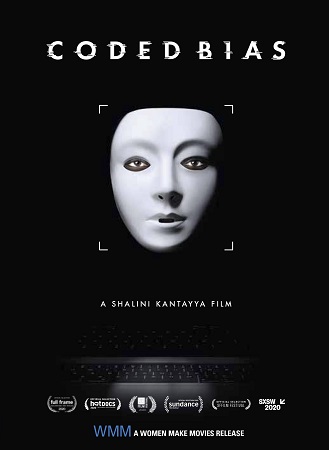
Coded Bias 2020
Distributed by Women Make Movies, 115 W. 29th Street, Suite 1200,New York, NY, 10001; 212-925-0606
Produced by Shalini Kantayya and Sabine Hoffman
Directed by Shalini Kantayya
Streaming, 90 mins
College - General Adult
Ethics; Justice; Technology
Date Entered: 12/14/2021
Reviewed by Dorothy Ogdon, Head of Emerging Technology and System Development, University of Alabama at BirminghamShalini Kantayya’s Coded Bias is a timely and incisive documentary that examines the social, ethical, and legal consequences of the use of artificial intelligence technologies. It has won multiple awards, including the Grand Jury Prize, Best International Documentary at the Calgary International Film Festival and Vanguard Award at the I Will Tell Film Festival. The film provides an intersectional introduction to issues surrounding widespread deployment of decision-making systems that integrate artificial intelligence and machine learning. It is highly recommended for viewers of any disciplinary or educational background.
The film is structured around interviews with Joy Buolamwini, a PhD candidate at in the Massachusetts Institute of Technology’s Media Lab, and her experiences implementing and critically examining the behavior of facial recognition software through her Aspire Mirror project. While building the Aspire Mirror Ms. Buolamwini observed that the facial recognition software used in her project did not correctly detect her face unless she first put on a white mask. Upon further examination and analysis of the results of multiple facial recognition software packages, Ms. Buolamwini demonstrated that facial recognition software failed to correctly detect non-white non-female faces with the same accuracy that it detected white male faces. The film provides an overview of Ms. Buolamwini’s experiences as she shares the results of her research with both the companies creating these software tools, academics, and lawmakers.
Interviews with Ms. Buolamwini are complimented by interviews with experts on issues of justice in artificial intelligence, machine learning, and the implementation of algorithmically driven decision systems. Notably, the majority of expert interviews in the film feature female authors and academics, a particularly thoughtful choice, given the problem of gender diversity in technology, a topic that is addressed in the film.
People who have already been negatively affected by algorithmic decision making are represented and footage of police stopping and detaining individuals in London following misidentification by facial recognition software is a part of the film’s narrative.
The social and ethical implications of machine learning and algorithmically-driven systems are critically examined in the film and thoughtful comparisons are provided that contrast the way artificially-intelligent systems are being used in China and the United States to control or influence social and political behaviors.
Coded Bias is engaging and will be accessible to a wide variety of viewers, regardless of their level of technological literacy. It invites viewers to examine their own agency regarding the technologies driving the decisions that affect their personal and financial lives and provides a strong argument regarding the need for regulation and critical examination of intelligent systems. The film will be an excellent addition to any technical course as an invitation to students to examine the broader effects of the technologies and tools they are learning to create. Groups with a focus on issues of diversity, equity, and inclusion, the dynamics of power and wealth, finance, law, ethics, and criminal justice should also consider this documentary for viewing and discussion.
Awards: Critics’ Choice Award Nomination, Best Science Documentary; NYWIFT Excellence In Filmmaking Award, Hamptons International Film Festival; Grand Jury Prize, Best International Documentary, Calgary International Film Festival; Filmmaker Award, Globedocs Film Festival; World Organization Against Torture Award, Festival Du Film Et Forum International Sur Les Droits Humain (FIFDH)
Published and licensed under the Creative Commons Attribution 4.0 license. Anyone can use these reviews, so long as they comply with the terms of the license.